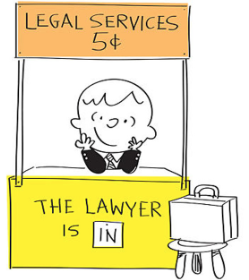Trend: Lower Cost Legal Services — How Will It Happen?
Posted By Cliff Tuttle | October 2, 2016
No. 1,286
There has been a lot of discussion of the future of the legal profession. A post in Lawyerist.com, a nuts and bolts blog for lawyers, summarizes conclusions in a book by a futurist named Suskind. He concluded that lawyers in private practice were being marginalized by, among other things, non-lawyers and technology. Suskind also predicted that small firms and solo lawyers would eventually cease to exist in the business environment of the future.
In another post, Lawyerist gave advice to solos and small firms on how to compete in this brave new world. Among its suggestions were to utilize technology and introduce the use of flat fees.
In my view, lawyering has unique characteristics that make the outcome differ from other enterprises. In most businesses, such as manufacturing, growth creates economies of scale. In a competitive marketplace, this leads to lower prices. However, that doesn’t seemed to be happening in lawyering. The larger a firm becomes, generally speaking, the larger its fees. This is because there is no assembly line in a law firm. No matter how large the firm becomes, each lawyer is still an individual craftsman at his own work bench. Yes, there is a support staff. But the outcome is not a cheaper product. The support staff enables the lead lawyer to produce more and to do it quicker. The client pays extra for product improvement, including speed. The bill goes up, not down.
They say that fees bear a relationship to the difficulty of the work and the required skill. While there is truth to that observation, it is also correct to say that the fee bears a direct relationship to the amount of money at stake. A client won’t knowingly spend $2,000.00 to recover $1,000.00. What you get, then, is a variant of Parkinson’s Law. The volume of work (and thus the fee) rises to meet the value of the money pot at the end of the rainbow.
Larger firms charge more, in part, because they can. Their clients eschew cheaper alternatives because they think they need a better (pronounced “more expensive”) lawyer. Sometimes they are right, but just as often they are wrong. A lawyer who is mismatched with a case or task is usually too expensive, regardless of the fee.
There are many lawyers who are a good value precisely because they are a good match. That’s the trick. Spend more legal resources than necessary and there is waste. Spend less and you risk losing a case that could have been won. Nevertheless, clients are getting better at finding that match.
Much of the credit for this trend goes to institutions like AVVO. This website presents the consumer of legal services with choices. Every American lawyer has an AVVO page. This gives them an opportunity to compete for the attention of the growing number of people (especially millennial) who are going on line to search for lawyers. This is the 21st Century lawyerly equivalent of speed dating.
Contrary to the popular wisdom, small firms and solo practitioners can thrive in this environment. They can beat the larger firms on cost by cutting overhead. They can deliver high quality service by specialization and by tailoring the amount of work to the requirements of the job. And they can gain access to a wider range of clients today through the internet.
One advantage that sole practitioners often have is the ability to offer fixed fees and fee caps. Under a fixed fee or fee cap arrangement, the lawyer assumes the risk that the amount of work will exceed the estimate, since there are no payroll and other direct costs that balloon the financial investment in the case.
Fixed or capped fees are briar patches and rabbit holes that Brer Fox and Brer Bear cannot enter. Sometimes it can pay to be quick and small.
CLT




